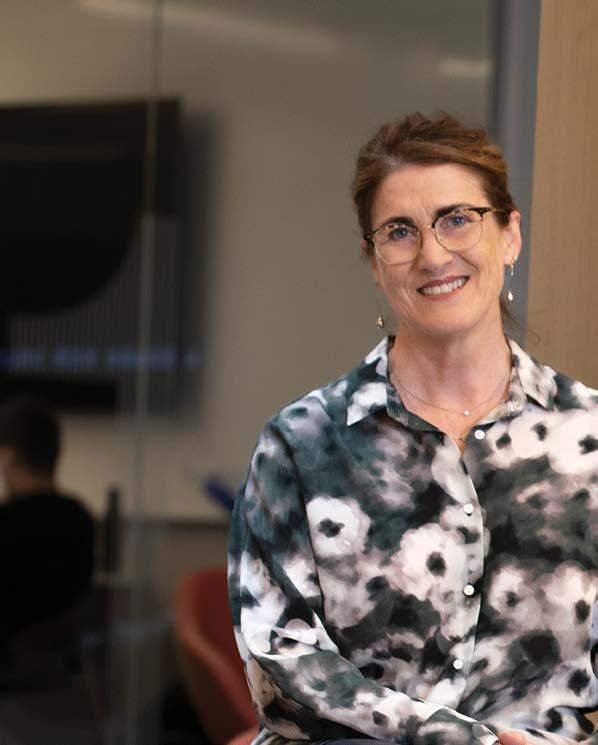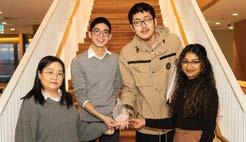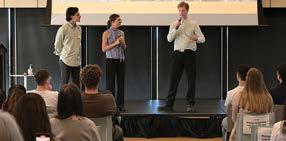
3 minute read
Teaching excellence
TEACHING FOR ENGAGEMENT
10
FORMULA FOR SUCCESS
When it comes to numbers, Senior Lecturer Gerrie Roberts is proving greater student engagement equals better academic performance.
Department of Econometrics and Business Statistics Senior Lecturer Ms Roberts rejects the stereotype that you’re either a maths person or you’re not. “For some, anything to do with numbers has previously involved a negative experience,” Ms Roberts says. “The aim of my current work is to instil in students a belief that, despite much of the prior information received in their formative years with respect to maths, they are capable and can go on to become the brightest shining lights in their cohort.” Ms Roberts uses technology to support an independent learning strategy she calls ‘Engage and Succeed’, which aims to not only make statistics accessible and relevant, but enjoyable as well. Her pre-class Moodle lessons and quizzes prime students ahead of interactive lectures, which incorporate in-class response technology to enable collaborative learning and feedback. “Monitoring student responses with live performance analytics means I can pinpoint exactly where they are struggling and adjust the instruction accordingly, in real time,” she says. “The early intervention and support are critical success factors in helping students engage and succeed.”
Ms Roberts says the focus on interactive teaching has enhanced the student experience and achieved substantial improvements in engagement and academic performance. Ms Roberts’ innovative teaching approach has gained recognition from colleagues, the university and the broader community, and she has been invited to present her findings at conferences and in journals.
11
FAST TRACK FOR THE FUTURE-MINDED
L – R: Tengyue Shao, Anthony Ta, Fan Wu, Sanuja Thavarajah

WORLD-FIRST PARTNERSHIP
Monash Business School students are taking on one of the most complex issues of our age – how nations can transition to sustainable energy. The challenge is part of a world-first partnership between Monash Business School, the United Nations Economic and Social Commission for Asia and the Pacific (UNESCAP), research consultancy InceptLabs and the Institute of Public Accountants (IPA). Monash Business School’s Course Director Professor Nicholas McGuigan says the multi-sector collaboration grew out of the need to respond to the global pandemic. “We knew we had to find a new way to educate, something that would prepare our graduates for uncertain, rapidly changing, complex business environments,” he says. Professor McGuigan joined Incept Labs chief executive Rob Kay and IPA Director of Education Philomena Leung to design a learning program never before attempted in a university context. For the inaugural challenge, student teams tackled SDG 7: Energy Transition for the Asia-Pacific Region. During the intensive ten-day program, multidisciplinary teams collaborated to undertake independent research, create stakeholder analyses, and find holistic solutions to the problem. The Resilient Energy and Cybersecurity Technologies Toolkit (REACTT) – a knowledge toolbox to provide policy advice to governments on the risk management component of energy transformation - was named best overall solution by UNESCAP. “Our solution ensures that even if a country experiences military, political or other turmoil, it will not affect its steady progress towards the relevant goals of the United Nations SDG7,” participating student Fan Wu says. IPA Group CEO, Andrew Conway said the IPA was delighted to partner with Monash Business School and the UNESCAP. “It is vitally important that we prepare our student founders for the reality of start-ups,” says Professor David Gilbert, founder and leader of Monash Business School’s Fastrack Start-up Program. “Start-ups are now seen as a legitimate career pathway for students and COVID-19 has amplified the need for students to be switched on to the opportunities that an entrepreneurial mindset and the capabilities to execute, can bring.” The Fastrack Start-up Program is the flagship program of the Entrepreneurship portfolio at Monash Business School. It is a two semester real-life experience that sees student founders launch a business with paying customers in just 24 weeks. In 2022 Fastrack was offered for the first time across Monash University via competitive entry with over 1000 applications for 36 places in the program. Eight different faculties were represented by this year’s cohort. It is an internationally recognised program supported by toptier companies and organisations from Australia, Silicon Valley and Israel. It is co-designed and co-delivered with industry partners from around the world. “I am very proud of the transformation of students to outstanding professionals who can hold a seat at any table in the world and have a real impact,” he says.










